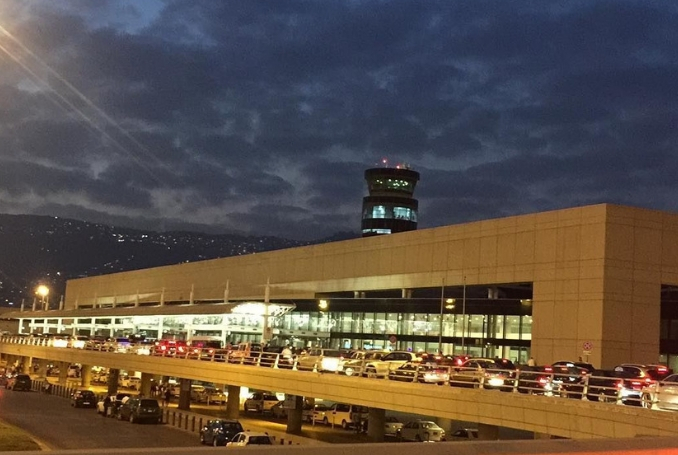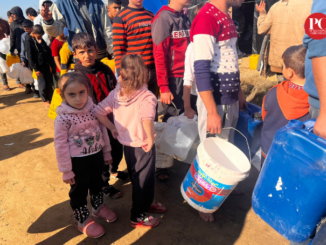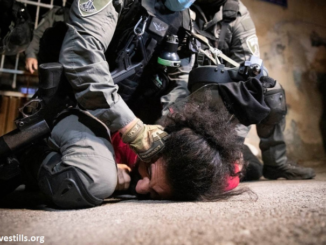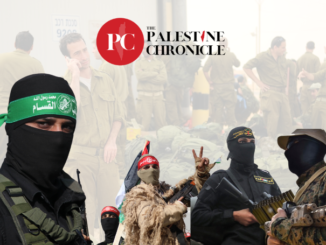
More than a month ago, I had been invited by the American University of Beirut (AUB) to participate as a speaker in a conference titled A Hundred Years of Human Displacement (1919 – 2019). I had just come back from The Colonised Territories of the West Bank after having conducted a few seminars in Al Najah National University in Nablus and Khalil Al Sakakini Cultural Centre (Mahmoud Darwish’s former office) in Ramallah on the same theme of the poetics and problematics of displacement, and the politics of home and identity, and other relevant themes such as nostalgia and memory.
And thus, I was very excited to be invited by such a prestigious university to participate in such a timely subject matter on which I have written a book with Palgrave Macmillan titled ‘Writing Displacement‘. I had been researching on displacement since I started a Master’s degree in England in 2005; when I decided to come back to The Middle East in 2015 to pursue a career in academia, The AUB was a favorite destination.
However, bombings during that particular year forced me to look elsewhere. Thus, and since then, I have settled alternatively and happily in Amman. The AUB’s invitation four years later was more like a homecoming.
May 13, 2019. 1:25 pm. Amman International Airport.
I ordered a taxi to the airport. He picks me up. Loaded with the curiosity of any taxi driver, he advised me that traveling was made easier in the past. “You could travel throughout The Middle East for less than 250 US Dollars by car!” he said. He only maintained eye-contact when I exclaimed ignorance. I tend to practice that with taxi drivers to soak more juice out of their steak of narratives. He recommended a few places in Beirut. I added those to my very rich to-do list.
The hotel booked for me in Beirut was located on a street named after Madame Curie: the first woman to win a Nobel Prize, the first person and only woman to win it twice, and the only person to win a Nobel Prize in two different sciences. I spent hours on daily basis thereafter making phone calls and measuring distances between the district of Ras Beirut and Tallet Jounblat, between The AUB and Dar El-Nimer for Arts and Culture, between Corniche El Manara and Port of Beirut. I had already walked the streets and, thanks to Google Maps, memorized the geography of the city by heart.
I had already familiarised myself with the biographies and scholarly work of all participants in the conference and prepared questions and opening-lines with most of them. I had revised my talks from Ramallah and Nablus so that I could make it different and refreshing for both the audience and myself. At the airport in Amman, the airline officer asks me if I had ever been to Palestine. She checks my Jordanian and German passports for any Israeli stamps. She finds none. I confirm.
On the plane, I indulge in Italo Calvino’s ‘Invisible Cities‘, from which the main title of this article is quoted. This is the second time this book accompanies me on board of a plane. Despite its simplistic style, brevity, and structure, this book is a magic box: it surprises you every time it opens. I read. The curtain between economy class and first class shuts to save us further humiliation of the execution of class difference. Approaching landing, I see snapshots of Beirut and the Mediterranean coast through a hole of a needle from the plane’s window.
4:15 pm. Beirut International Airport. Lebanon.
I arrive in the land of civilization, in ‘Byblos‘, one of the oldest cities in the world, the homeland of Canaan, to the beginning of language and the alleged invention of alphabets, to the locale of the First Crusade that gave birth to The Kingdom of Jerusalem. I arrive in the country of resistance and revolution, of Mount Lebanon, to the country of millions of displaced and twenties of rivers, the country of Khalil Gibran and Ameen Rihani, to the country of eight governorates swimming the shores of the Mediterranean.
A few minutes separate you from The Paris of the Middle East. Posters of main cities of Lebanon in the airport remind you of many references of zajal, a traditional form of oral strophic poetry declaimed in a colloquial dialect, which we used to sit around and watch as a family during the 1990s: during the renaissance of Lebanon. After The Lebanese Civil War, Lebanon was the most liberal media in the region. It was also the first to legalize private ownership of television and radio stations.
Walking towards the passport-check-in-desk, I started thinking of how my name will look like on the placard held by the driver upon my arrival. Is it going to be the name on my Jordanian passport, the name with which I write: Akram Al Deek? Or will it be the name on my German passport, which administrative officials at the AUB advised me to use: Akram DiK? How beautiful it will be to sit down and write something on Saint Nicholas’ Staircase in Ashrafieh? Or under a cedar tree somewhere on the AUB’s campus?
Entering with my German passport, I was asked to step aside from the airport checkpoint and follow an official to a Law Investigation Enforcement Office.
“Where are your parents from?” asked the officer behind his desk as he stared at my passport.
“Palestine. But …”
A group of officials gather around him. They stare at the passport, too. I am stood by the door. A young official in her early twenties offers me a seat. A security officer is dispatched to fetch something. I stare at officers as they stare at my passport. The officer comes back with a folder. Stamps from 2015 written in English are compared to those in the file. They match older Israeli ones. A higher command officer comes in.
He whispers to the officer behind the desk: “Did you ask him THE question?” They whisper some more. The young officer in her twenties intervenes, “I am not in favor of your decision to deport him!”
“Will you let him enter at your own risk?” asks the officer behind the desk.
“I would not!” murmurs everyone in the room. I watch this behind the stage as if it were a play into which I am waiting to enter.
The word “deportation” echoes a few times in the air. It seems I am no longer part of the script. “I go to Ramallah to visit relatives and for academic purposes,” enters I. No one seems to listen. “If there is anything wrong with my German passport, I can enter as an Arab with my Jordanian!” All eyes turn on me.
“We will need that, too!” orders the officer behind his desk. They scan both passports and fill in paperwork as the two higher command officers shake hands and smile happily at one another. “Good job!” they cheer.
Was this a celebration of Lebanese nationalism, antagonism towards defeated Arab-nationalism, years of war with Israel, or retaliation of the 1970s and 80s when the PLO’s attacks on Israel resulted in the siege of the city of Beirut?
Am I the scapegoat of such historical displacement?
Life at the airport goes on but nothing happens. I am left watching passengers pass through the front desk while some officers start planning what they are having to eat to break their fast. Officers leave and I am asked to stand and join an escorting soldier to Gate 23: an abandoned area at the very end of the airport. We go through many doors. I ask questions but the soldier claims he knows nothing. We pass Gate 23 by and continue to the back alley that leads to an area in-between departure and arrival. Pilots and stewards come and go through this corridor.
The escorting soldier disappears as he asks me to enter a facility that looks like an operating room. The officer behind the desk continues paperwork, keeps hold of my passports, and asks me if I had ever faked my passports. Bombarded with thousands of questions, he maintains eye contact for the first time as he informs me that I am being deported due to political reasons. “Your flight leaves tomorrow morning at 8 o’clock, Akram. To each country its own policies that you just have to accept.”
I must admit that I smiled for the first time in hours subsequent to his statement. I was called by my own name. I was acknowledged as a subject for the first time in hours since my detention. For hours, I was nothing but either the projection of passersby as they saw me being escorted by officers or my projection in the eyes of the officers themselves staring in my passports.
7:00 pm. Reading Italo Calvino’s ‘Invisible Cities‘ in the Detention Room beyond Gate 23.
I was asked to wait in an air-conditioned room with three black leather sofas. I could see pilots and stewards pass the room by behind slightly curtained windows. The same windows overlooked the coastline of Beirut. The sun was out but I was freezing. I was told my luggage will be in-transit directly to Amman. All I had with me in the detention room was a copy of Calvino’s ‘Invisible Cities‘ and a yellow highlighter. Calvino’s book deconstructs one of the most renowned archetypal pieces of travel literature: ‘The Travels of Marco Polo‘. In poetic prose, Calvino reimagines cities in relation to memory, desire, signs, names, the dead, and many other categories.
In fifty-five chapters, Calvino offers us a surreal, postmodern matrix of cities visited through the language of the imagination. These cities are “invisible” because they are never seen but rather described. They might not even exist. Like all travelogues, we can never know what actually happened. All that we are left with is the narrator’s philosophical interpretation of space and its urbanity and its identity and culture through the narrators’ artistic reflections. Calvino’s book asks questions such as do empires exist beyond the traveler’s language? And what is the nature of reality?
‘Theodora’ is among the hidden cities in the book, and what was long concealed in its memories and libraries is unwittingly revealed by the actions of its citizens. In the voluptuous trading city‘Chloe‘, strangers consummate strange intimacies in silence and without even touching. Anastasia is a city with concentric canals watering it and kites flying over it. You only enjoy ‘Anastasia‘ when you are only its slave. In the city of ‘Tamara‘, your gaze scans the streets as if they were written pages: the city says everything you must think. You leave Tamara without having discovered it. ‘Zoe‘ is the city of invisible existence. In the city of ‘Hypatia‘, one’s only desire is leaving it.
I could see Beirut visible in each characteristic of these invisible cities: a desert of seas.
My reading is interrupted by screaming in the corridor. In the room next door, a group of Africans seem to have been waiting to be deported for a while. They ask for pizza to break their fast. The officers bring them chicken instead because it is cheaper. “If you want pizza, you have to pay for it!” shouts the officer.
A man burdened with a thousand years of displacement comes into the room where I wait. He is a Syrian who works in Iraq and is visiting friends and family in Lebanon and has been asked to wait in the detention room. “Are you surprised they are not letting you in!” he exclaimed. “In the 1970s, Arafat made a whore out of Beirut!”
The room is becoming colder by the minute. I am becoming hungrier for food and open skies. The sun has set behind the coastline. I can see it behind closed doors and curtained windows. A woman with her child enters the room of detention. The child fills the silent void with cries. I negotiate with the officer leaving the airport on an earlier flight at my own expense. I am escorted to pay for my ticket. The airlines fill in reports and in coordination with the Lebanese authorities facilitate my deportation. Five hours go by.
I am escorted by another security officer from Gate 23 to the airplane. “Be honest!” he suddenly speaks. “Have you faked your passports?” He makes sure I am handed to the lead steward on board of the plane. “A deportee!” he announces to everyone else. I am looked at as some kind of a terrorist. My mobile phone is now connected to the internet. E-mails flow in from the AUB inviting the speakers for dinner at Abdulwahab the next day. Friends send me lists of things to do in Beirut. I see the sea of Beirut from the small window on board the plane.
I have been deported from and detained at Beirut International Airport on the basis that my passports have a history of entries to Occupied Palestine/Israel. I went from a scholar invited by The American University of Beirut to deliver a talk as part of a conference marking ironically 100 years of human displacement this week, to a political deportee overnight.
I have been disallowed entry to Lebanon forever for no particular fault of mine. I was interrogated and shamed for my parents’ origins. And I was shamed for visiting my relatives in the Occupied West Bank. No one explained to me why I was being deported. I was denied my passports and luggage all the way, too. I was a nobody.
This is by no means meant to be in opposition to Lebanon or its government. I wish I could say Lebanon is such a beautiful country because I have never been to Lebanon, and after becoming a political deportee yesterday, I will probably never know. The Lebanese are such beautiful people. But I am disappointed and frustrated and angry at the whoredom of geography and politics.
I am an Arab who cannot travel within The Levante without intensive interrogation, and this time deportation. In Palestine, I am not Palestinian enough. In Jordan, I am not Jordanian enough. In Syria and Lebanon, I am a Palestinian-German who entered the land of the occupier. In Germany, I am but my parents’ son who is a Palestinian born in Jordan. In England, I am a German whose parents are Palestinian, and speaks good English.
I am disgusted to the bone of reciting the history of The Levante and Middle Eastern politics every time I travel, of my parents history and exile, of my in-betweenness and writings, of my two passports, of why my German passport is issued in Edinburgh of Scotland and of why my parents are Palestinian but I was born in Jordan, of why I keep visiting Palestine, of why I had once been in Syria, of why my name on my German passport differs to the Jordanian.
I have been born to this. I am certainly not the subject of my own narrative. I wish my answer to questions like “where are you from?” was shorter. That I can for once travel and catch my luggage on the carousel with the rest of the flight passengers – if at all!
I have been born into this whoredom of politics. The cause was wars a long time ago. Yet, I am still the product that pays the price 100 years on: of two world wars and one hundred years of human displacement; a theme I take part in, not as a speaker and a scholar in a conference, but as a detainee.
No human being should be held accountable for an absent presence called history. No human being should be held responsible for an accident called birth. No human being should stare at cities behind closed windows.
May 14. 2 am. Amman International Airport.
Upon landing in Amman, I was then handed by a police officer outside the doors of the plane to the Jordanian Secret Service Office for interrogation and then release an hour later. I am handed my passports for the first time. My luggage is the only one swirling around the carousel.
A friend tries to humorously console me. “You will have something to write about!” he says. Unfortunately, sometimes language will not have the capacity to carry the abyss of being an Arab.
– Akram Al Deek is Assistant Professor of Post-colonial Literature at the American University of Madaba (AUM), Jordan. He is the author of ‘Writing Displacement’, published by Palgrave Macmillan, and Eucalyptus Obliqua, published by Ward Publishers. He is a contributory columnist at Jordan Times. He contributed this article to The Palestine Chronicle.








I am surprised why do they ask, where are your parents from? even obviously they were not travelling! they already have both your passports and know your nationality and place of birth!
This kind of questions should be illegal as they are considered racial discrimination. Do they ask other Germans about their origins?
I am also an Arab with European passport, and I am well traveled, have been to more than 30 countries, and I can confirm that my worst airport experiences happen in Arab countries. I have never been interrogated or asked about my origins except in Arab countries. I am sorry to say this but, I will never visit an Arab nation again except for Hajj or Omra.
Regards